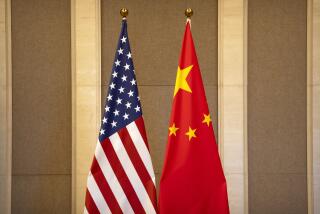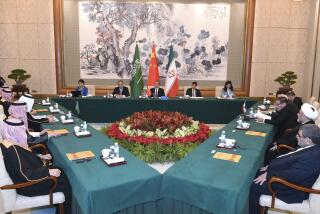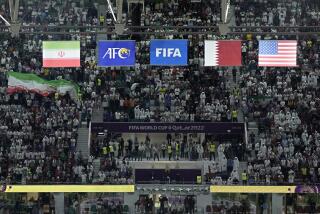China Defends Its Sale of Mid-Range Missiles to Saudis
BEIJING — Chinese Foreign Minister Wu Xueqian on Wednesday vigorously defended his government’s increasing international weapons sales, including the recent sale of intermediate-range ballistic missiles to Saudi Arabia.
Wu, speaking at a news conference, confirmed that China has sold “some non-nuclear, conventional surface-to-surface missiles” to Saudi Arabia, adding:
“The Saudi government made a commitment to us of no transfer, no first use of these missiles and to use these missiles entirely for defensive purposes. We believe that the Saudi government will honor its commitment.”
Vice Foreign Minister Qian Qichen joined Wu at the news conference and spoke out on the question of the Spratly Islands, in the South China Sea, where Chinese and Vietnamese forces fought last month. Qian demanded that Vietnam withdraw from the disputed islands, but he said China will not initiate any renewal of the fighting in the area. Both countries reported casualties in last month’s naval clash.
China’s sale of missiles to Saudi Arabia has caused concern in Israel, even though Saudi Arabia is believed to want them as protection against Iran. The missiles, which could be equipped with nuclear warheads, are capable of reaching any area in the Middle East. They can be used with conventional warheads to attack cities, but are not considered accurate enough to be useful against military targets.
Yossi Ben-Aharon, director of the Israeli prime minister’s office, was quoted last month as saying: “Israel has acquired a reputation of not waiting until a potential danger becomes actual.” In 1981 Israel sent aircraft to destroy a nuclear reactor near Baghdad that it believed was part of an Iraqi nuclear-weapons program.
The day after Ben-Aharon’s comment, Radio Damascus responded with a statement that “aggression against the sister kingdom of Saudi Arabia will be considered as aggression against Syria.” Jordan also expressed support for Saudi Arabia.
Wu said Wednesday that China supports Arab states in opposition to any threat of Israeli attack on the new missiles. But he insisted that the sale itself contributes to peace.
‘Conducive to Stability’
The missile sale, he said, “is conducive to the stability of the situation in Saudi Arabia in particular and to the Middle East in general.”
He said that China’s “attitude on the question of arms sales is a serious one (and) responsible as well.”
Showing irritation at repeated questioning about weapons sales, Wu pointed out that other countries are also supplying arms to countries in the Middle East.
“Some press tend to pick on China,” he said, “and whenever China sells weapons, China becomes the newsmaker. How about the weapons flying around over the (Persian) Gulf? There are many kinds of them. At least I know there are such weapons as the (American-made) Stinger and the (French-made) Exocet. These are not Chinese weapons. Why is it that some people always harass China with this so-called issue?”
Wu said his government wishes to see “the earliest possible establishment of diplomatic relations with Saudi Arabia,” one of the few countries that continues to recognize the Nationalist Chinese government on Taiwan.
He reaffirmed that Beijing has taken measures to stop the flow of Chinese-made Silkworm missiles to Iran. But he defended China’s sale of conventional weapons on the international market and acknowledged that some of them may find their way to Iran and Iraq, which have been at war for the past eight years. He denied, as his government has in the past, that China is selling arms directly to either country.
Western estimates place the value of China’s international arms sales, which have increased dramatically over the past decade, at $2 billion or more a year since 1986, apparently making China the world’s No. 5 weapons supplier. The hard currency realized as a result of such sales contributes to China’s military modernization.
Qian, the vice foreign minister, indicated that although China does not want war, it is prepared to continue to flex its military muscle in the dispute with Vietnam over the Spratly Islands.
“We do not wish to see an all-out war,” Qian said. “We have exercised utmost restraint. . . . There will be no war in the area if Vietnam refrains from provocation against China and stops the seizure and occupation of the islands and reefs of the Nansha (Spratly) Islands, and withdraws all its troops from these islands and reefs.”
Qian said that “statements, diplomatic notes, documents, maps and textbooks published by Vietnam before the year 1974” acknowledged that the Spratlys are Chinese territory. Photocopies and translations of Vietnamese letters, newspapers and maps distributed to the media appeared to support Qian’s statement.
More to Read
Sign up for Essential California
The most important California stories and recommendations in your inbox every morning.
You may occasionally receive promotional content from the Los Angeles Times.









